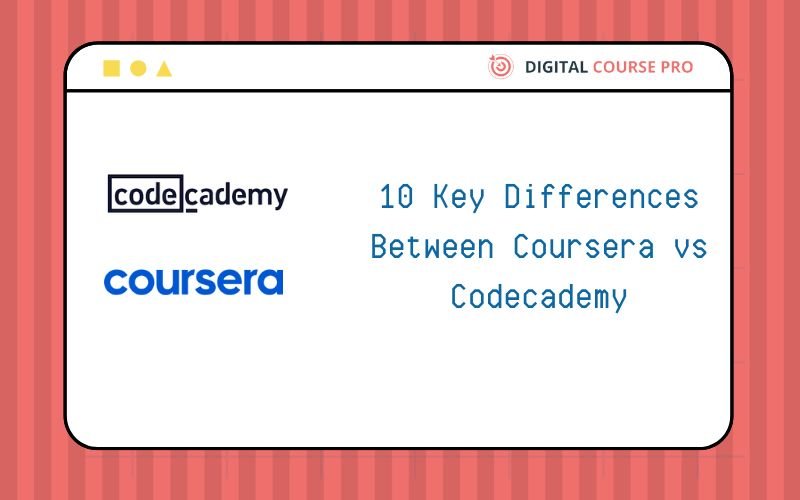Coursera vs Codecademy: In the ever-evolving landscape of online education, choosing the right platform to enhance your skills is crucial. Coursera vs Codecademy represent two of the leading platforms, each catering to different learning needs and goals. Understanding the specifics of Coursera vs Codecademy can help you make an informed decision about which platform suits you best.

Course Offerings
When it comes to the variety and depth of courses, Coursera vs Codecademy offers distinct advantages:
Coursera
Coursera collaborates with prestigious universities and organizations worldwide to provide a vast range of academic and professional courses. The platform boasts over 5,000 courses across multiple disciplines:
- Academic Courses: Coursera offers courses in fields like business, computer science, data science, arts, and humanities. These courses are often developed and taught by professors from top universities.
- Degree Programs: Coursera offers full online degrees, including Bachelor’s and Master’s programs, from institutions like the University of London, the University of Illinois, and more.
- Professional Certificates: These programs are designed in partnership with leading companies like Google, IBM, and Facebook to provide job-ready skills in areas like IT support, data science, and project management.
- Specializations: Coursera offers Specializations, which are series of related courses aimed at mastering a specific skill. These often culminate in a capstone project.
Codecademy
Codecademy focuses exclusively on coding and tech-related skills, providing a more targeted range of courses:
- Programming Languages: Codecademy offers interactive courses in a variety of programming languages, including Python, JavaScript, Java, Ruby, and more.
- Web Development: Courses cover front-end and back-end web development, including HTML, CSS, JavaScript, and frameworks like React and Angular.
- Data Science: Codecademy provides courses on data analysis, data visualization, SQL, and Python for data science.
- Computer Science: Basic and advanced computer science courses covering algorithms, data structures, and fundamental programming concepts.
- Career Paths: Codecademy offers Career Paths, which are curated collections of courses designed to help learners become proficient in specific tech careers, such as Full-Stack Developer, Data Scientist, and Front-End Engineer.
Learning Experience
The learning experience in Coursera vs Codecademy differs significantly due to their respective focuses:
Coursera
Coursera provides a more traditional, academic-style learning experience:
- Course Structure: Courses on Coursera often span several weeks to months, including video lectures, readings, quizzes, and peer-reviewed assignments.
- Academic Rigor: Many courses are developed by universities and taught by professors, ensuring a high level of academic rigor.
- Assignments and Projects: Courses include graded assignments, projects, and exams, requiring learners to apply what they’ve learned.
- Peer Interaction: Coursera fosters a collaborative environment with discussion forums and peer reviews.
- Hands-on Learning: Coursera Labs and projects provide practical experience in applying skills.
Codecademy
Codecademy offers a hands-on, interactive learning experience focused on coding:
- Interactive Learning: Courses are highly interactive, with learners writing code directly in the browser and receiving instant feedback.
- Project-Based: Codecademy emphasizes learning through projects, where learners build real-world applications and projects.
- Step-by-Step Guidance: Lessons are broken down into small, manageable steps, making it easier for beginners to grasp complex concepts.
- Community Support: Codecademy has an active community where learners can ask questions, share projects, and get feedback.
- Quizzes and Challenges: To reinforce learning, Codecademy includes quizzes and coding challenges.
Certification
Certification is another critical aspect where Coursera vs Codecademy differ:
Coursera
- Academic Credentials: Many Coursera courses offer certificates that include the branding of prestigious universities and organizations.
- Professional Certificates: Coursera provides professional certificates in collaboration with industry leaders, adding significant value to a resume.
- Degree Programs: Coursera offers accredited degrees, providing formal academic credentials recognized worldwide.
- Certification Value: Coursera certificates are highly regarded in both academic and professional settings.
Codecademy
- Codecademy Certificates: Upon completing a course or Career Path, learners receive a certificate of completion from Codecademy.
- Skill Validation: While not as prestigious as university-backed certificates, Codecademy’s certificates validate coding skills and are valued in the tech industry.
- Practical Focus: Certificates demonstrate practical coding proficiency, which is highly sought after by employers in the tech field.
Cost
Cost is a significant factor when comparing Coursera vs Codecademy:
Coursera
- Individual Courses: Many Coursera courses can be audited for free, but certificates typically cost between $29 and $99.
- Specializations and Professional Certificates: These programs generally cost between $39 and $79 per month.
- Coursera Plus: This subscription service costs $399 per year, providing unlimited access to over 90% of Coursera’s courses.
- Degree Programs: Full degree programs can range from $15,000 to $25,000, depending on the institution and program.
Codecademy
- Free Tier: Codecademy offers a free tier with access to basic courses and exercises.
- Pro Subscription: Codecademy Pro costs $39.99 per month or $240 per year, providing access to all courses, projects, and Career Paths.
- Codecademy for Business: Offers team-based pricing for businesses looking to upskill their employees.
Community and Networking
Community and networking opportunities in Coursera vs Codecademy also differ:
Coursera
- Discussion Forums: Coursera includes discussion forums in courses, allowing learners to interact, ask questions, and share insights.
- Peer Reviews: Assignments often include peer reviews, fostering a collaborative learning environment.
- Alumni Networks: Degree programs and Specializations may include access to alumni networks, providing long-term networking opportunities.
Codecademy
- Community Forums: Codecademy has active community forums where learners can seek help, share projects, and connect with peers.
- Events and Meetups: Codecademy hosts virtual events and meetups, providing opportunities for networking and collaboration.
- Project Sharing: Learners can share their projects and receive feedback from the community.
Instructor Quality
Instructor quality in Coursera vs Codecademy is another critical factor:
Coursera
- University Professors: Many courses are taught by professors from top universities, ensuring high academic standards.
- Industry Experts: Professional certificates and Specializations often feature instructors who are industry leaders and experts.
- Diverse Instructors: Coursera’s wide range of partners means that learners benefit from diverse perspectives and teaching styles.
Codecademy
- In-House Experts: Courses are developed by Codecademy’s in-house team of experts, ensuring consistency and quality.
- Practical Experience: Instructors focus on practical coding skills and real-world applications.
- Interactive Lessons: Lessons are designed to be engaging and interactive, making complex topics accessible to learners.
Mobile Accessibility
Mobile accessibility in Coursera vs Codecademy can influence your learning experience:
Coursera
- Mobile App: Coursera offers a robust mobile app, allowing learners to access courses, download content for offline learning, and participate in discussions.
- Flexibility: The app provides flexibility for learners to study on the go, making it easier to fit learning into a busy schedule.
Codecademy
- Mobile-Friendly Site: While Codecademy does not have a dedicated mobile app, its website is mobile-friendly, allowing learners to access courses from their mobile browsers.
- Interactive Coding: The interactive nature of Codecademy’s courses can be more challenging to navigate on smaller screens, but the platform is continuously improving mobile usability.
Course Duration and Depth
The duration and depth of courses in Coursera vs Codecademy vary significantly:
Coursera
- Course Length: Courses on Coursera typically range from a few weeks to several months, providing in-depth coverage of topics.
- Comprehensive Content: Courses include video lectures, readings, quizzes, and assignments, offering a comprehensive learning experience.
- Structured Learning: The structured format ensures thorough understanding and mastery of the subject matter.
Codecademy
- Short Modules: Codecademy’s courses are divided into short, interactive modules that learners can complete at their own pace.
- Project-Based Learning: Emphasis on projects and real-world applications ensures practical understanding and skill development.
- Flexible Learning: Learners can progress through courses quickly or take their time to master each concept.
Corporate Training Solutions
Both platforms offer corporate training solutions, but their approaches differ:
Coursera
- Coursera for Business: Offers tailored learning programs for businesses, including access to courses, Specializations, and professional certificates.
- Upskilling and Reskilling: Focuses on upskilling and reskilling employees with academic rigor and industry-recognized credentials.
- Analytics and Reporting: Provides tools for tracking employee progress and measuring the impact of training programs.
Codecademy
- Codecademy for Business: Provides team-based pricing and access to the full range of Codecademy courses and Career Paths.
- Practical Coding Skills: Focuses on developing practical coding skills that employees can apply immediately in their roles.
- Interactive Learning: Emphasizes interactive, hands-on learning to keep employees engaged and motivated.
Comparison Summary
When comparing Coursera vs Codecademy, consider the following:
- Coursera:
- Offers a wide range of academic and professional courses across multiple disciplines.
- Provides opportunities for earning certificates, Specializations, professional certificates, and full degrees.
- Ideal for learners seeking comprehensive, structured learning experiences and recognized credentials.
- Cost varies from free to several thousand dollars, depending on the course or program.
- Codecademy:
- Focuses exclusively on coding and tech-related skills.
- Provides interactive, hands-on learning experiences with a strong emphasis on practical application.
- Suitable for beginners and those looking to quickly acquire coding skills and build projects.
- Cost-effective with a free tier and affordable subscription options.
Choosing between Coursera vs Codecademy depends on your learning goals, preferred learning style, and budget. If you seek academic credentials and comprehensive courses across various subjects, Coursera is the better choice. If you want to learn coding through interactive, project-based exercises, Codecademy is an excellent option.
To delve deeper into how online learning can enhance your career, visit Digital Course Pro.





